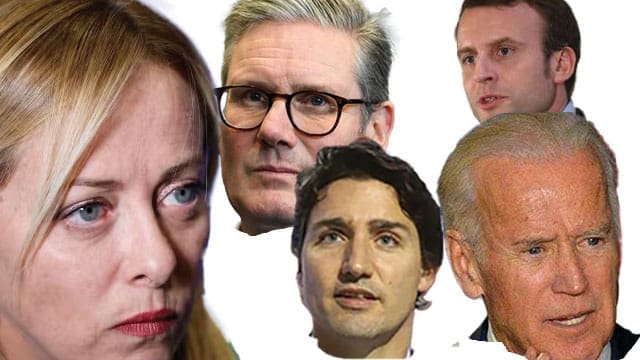They are pushing their own pet agendas while ignoring their citizens’ top concerns

For interview requests, click here
Political leaders – be they presidents or prime ministers – seem to be deeply unpopular these days. It’s almost a universal thing. There’s Justin Trudeau in Canada, Joe Biden in the United States, Emmanuel Macron in France, and Olaf Scholz in Germany. Even the United Kingdom’s freshly installed Keir Starmer is showing early signs of running out of road.
Mind you, this isn’t an entirely new phenomenon. Things also seemed pretty dire back in the late 1970s, so much so that it was fashionable to write think pieces pondering whether the job of U.S. president was doable anymore. Even if you weren’t keen on the results, two terms of Ronald Reagan answered the question affirmatively: Yes, it was possible to have a purposeful, consequential presidency.
As for today’s distemper, here are a few thoughts.
It isn’t necessarily a question of “strength”
 |
| Recommended |
| Was Trudeau’s promise of “sunny ways” always a con?
|
| Trudeau’s sunny ways are turning into dark days
|
| The Trudeau Liberals have completely abandoned all liberal ideals
|
Although discussion often focuses on the need for “strong” rather than “weak” leaders, there’s more to it than that. Trudeau, for instance, is strong by any conventional definition. He has an agenda he’s committed to and he’s prepared to stand up for it. To borrow a phrase from Margaret Thatcher – he’s “not for turning.”
However, he isn’t quite the sunny soul he once purported to be, and the issues that he’s most passionate about – such as Net Zero and DEI – don’t resonate with Canadians to the same degree as they do with him. His personal strength – now perceived as arrogance – has turned into a liability.
We’re reluctant to talk about trade-offs
One of life’s fundamental lessons is that virtually everything involves a trade-off. If we want something, it’ll have to be paid for, whether financially or by foregoing some other potentially desirable activity. However, we have difficulty injecting that basic insight into political discourse. We prefer to either assert that someone else will pay for it, or that there’s really no downside.
Net Zero – a worthy cause that’s potentially fraught for many countries – is a particular example of avoiding or downplaying the trade-off issue.
Desirability notwithstanding, getting there in the committed timeframes is deeply problematic. The investments are enormous, and not all the requisite technology currently exists. However, it’s been sold as an unambiguously positive thing and thus generates wide approval at a superficial level. But it’s a different story when you ask people to personally pay for the transformation. And because modern society is entirely dependent on abundant, affordable and reliable energy, the scope for future disruption and discontent is acute.
A democratic deficit
Another thing that sours public attitudes is the sense that voting doesn’t necessarily matter much. It’s as if there’s a permanent government in place, and it’s ideologically hostile to public opinion on a number of important topics. Compounding this perception, courts appear to be increasingly untethered by either the explicit language of the written law or by established precedent.
Illegal immigration is one of the most emotive subjects in contemporary political discourse. After all, protecting and controlling the border is surely one of government’s fundamental responsibilities. But it’s a responsibility they’re either unable or unwilling to discharge.
Lest you think this is just an American issue ginned up by the likes of Donald Trump, take a look at Western Europe. There, public unhappiness has swelled to the point that “far right” parties have made substantial electoral gains. If “stopping the boats” is manifestly beyond the capability of mainstream governments, then other radical options will be pursued.
Amidst all this angst, Italy’s Giorgia Meloni is emerging as a surprisingly influential figure. Widely derided as a “fascist” when she assumed office two years ago, Meloni has become the person beleaguered European leaders increasingly look to for tips on how to deal with the problem.
Because of its geographical location, Italy is especially vulnerable to illegal seaborne arrivals, many of whom come as ostensible refugees from countries like Egypt, Tunisia, Pakistan and Bangladesh, none of which are at war. Meloni ran for office pledging to stop this and has already enjoyed some success in terms of reducing the numbers. But once someone sets foot on European Union soil, it’s difficult to deport them. Hence Meloni’s latest strategy: Prevent their arrival in the first place
Accordingly, she’s struck a deal with non-EU Albania. Migrants intercepted by the Italian navy and coastguard will be directly delivered to Italian-controlled processing centres in Albania for assessment. And those that aren’t considered bona fide refugees will be deported to their countries of origin without ever setting foot in Italy.
Predictably, this has raised protests, and a Rome court has ruled that Meloni can’t do this, a decision she’s appealing. But if the EU’s legal system ultimately sustains that initial judgement – effectively deciding that Third World countries are by definition “unsafe” and thus anyone who can get to Europe is entitled to enter as a refugee – the political ramifications could become very unpleasant indeed.
Troy Media columnist Pat Murphy casts a history buff’s eye at the goings-on in our world. Never cynical – well, perhaps just a little bit.
The opinions expressed by our columnists and contributors are theirs alone and do not inherently or expressly reflect the views of our publication.
Troy Media
Troy Media is an editorial content provider to media outlets and its own hosted community news outlets across Canada.
